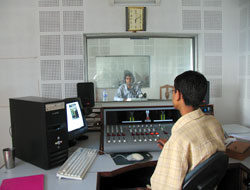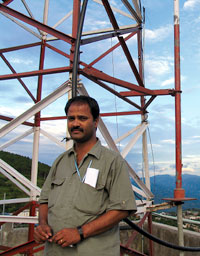|
|
| RADIO CONTACT: The Radio Paschimanchal studio in Tansen which was recently renovated after being damaged during a Maoist attack in February |
When an approaching storm rattled window panes at the Nepal Army barracks here last week, the sentry guards thought the base was under attack and let off a volley of warning fire.
The Maoists, who had been holding a mass meeting to push their agenda of Magar autonomy promptly issued a statement accusing the army of firing at them. Although things may seem outwardly calm here in the hills of central Nepal, incidents like these prove this is a hair-trigger ceasefire.
In the bajar, Maoist extortion is intense. The hotel in which rebel leader Ram Bahadur Thapa is staying has been taken over by Maoist milita. Visitors aren't allowed and those who enter are body searched. The lobby is full of Comrade Badal's bodyguards stretched out on the sofas watching news of the de Mistura visit on tv.
The district capital of Tansen still shows scars of war: the old palace that housed the local administration is in ruin-a daily reminder to Palpalis of the Maoist attack on the night of 3 February in which at least 16 people were killed. There is a plan to rebuild the palace, but some want to keep it as a reminder of the senseless waste of war.
Up on the ridge overlooking the town, Radio Paschimanchal was literally caught in the crossfire that night. In the dark, a small army patrol ran right into one flank of the attacking Maoist force and a fierce firefight ensued. The soldiers ran up to the roof of the hotel above the radio's studio while 400 Maoists went on surrounding rooftops.
There are still bullet holes in the studio's acoustic panels. On the roof, station manager Damodar Khanal shows us the damaged antenna, pock-marked and bent by bullets. "The battle lasted all night, and we found the bodies of two soldiers right here, next to piles of cartridges," Khanal says.
Radio Paschimanchal is one of four FM stations in Palpa and was out of air for three weeks after the attack, it has resumed broadcast but at only one-third its transmitting capacity. "Many people said that they'd help, and the government promised compensation, but we still can't transmit at full strength because we don't have Rs 300,000 for the transmitter," Khanal says.
|
|
| Station manager Damodar Khanal. |
In April, this radio as well as FM stations across the country played a critical role in defying government control on information and spreading the word about the pro-democracy movement through news, interviews and studio discussions.
Radio Paschimanchal is part of a network of over a dozen district stations that exhanged news and programs about the intensifying protests during the uprising. Its partner station in Kathmandu, Nepal FM 91.8, brought news of what was happening in Palpa and elsewhere to the capital as news of the street agitation in Kathmandu was beamed live across Nepal.
Radio journalists and producers from across the country met in Kathmandu last week to analyse their own role in the April uprising and brainstorm about how to strengthen the role of medium in supporting public debate and free speech. District FM stations were banned from broadcasting news for four months, later they were harassed and some were raided for trying to do independent journalism. In Tansen, radio stations banned from airing news and current affairs turned to SLC coaching classes which became widely popular.
"It was community radio that gave voice to people who would not otherwise have been heard," says Min Bahadur Shahi whose group runs Karnali FM in Jumla, "during the conflict the medium played the role of a mediator." However, Shahi says Karnali FM is often off the air because of transmitter problems caused by unreliable power supply, and the lack of kerosene for the backup generator.
Now that democracy has been restored, seemingly small logistical problems like these have prevented community radio stations to fulfil their true potential. Station owners are also critical of the government which they say only pays lip service to radio. Although Finance Minister Ram Sharan Mahat in his budget wrote off for this year the annual Rs 200,000 royalty that FM stations have to pay to the government other taxes remain.
"The government says information is a citizen's right but we have to pay income tax, VAT, a four percent levy on all transactions and excise," points out Raghu Mainali of the Association of Community Radio Broadcasters. The irony is that other businesses that invest in remote areas of Nepal are eligible to a tax holiday.
There are nearly 100 applications for new FM stations pending at the Ministry of Information and Communications and the association wants the registration process streamlined and expedited. Radio journalists say more FM stations are needed for public debate and education since most people don't know what a constituent assembly is.
"Even commercial FM stations like ours played a key role in conflict resolution and during the democracy movement," says Khanal in Palpa, "so the government can't make a distinction between commercial and non-profit radio in rural areas."




